© Pint of Science, 2025. All rights reserved.
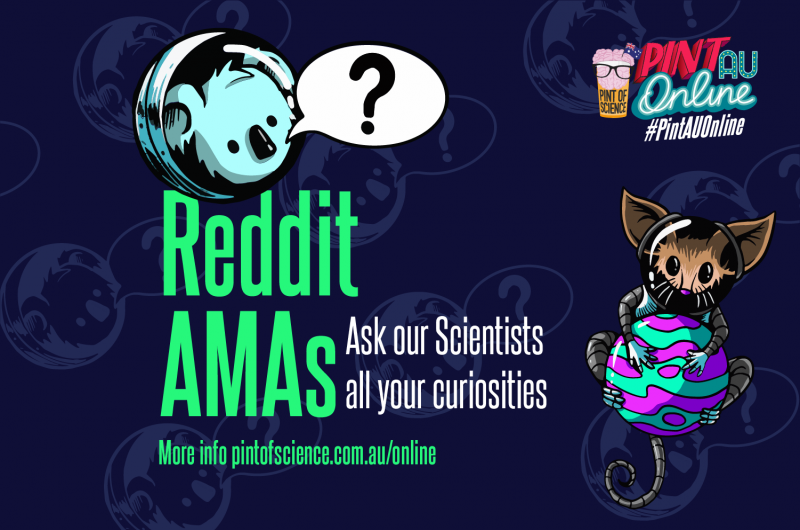
We've gathered up some talented, knowledgeable, and enthusiastic scientists to answer your questions in a series of Reddit Ask me Anythings May 11-13.
Follow us on social media for videos and posts about our contributors in the week leading up to the AMAs and the AMA link 30mins before the start, then add your questions using the subreddit r/IAmA posted by u/pintofscienceau (and others) and join the discussions. Not on Reddit? No worries, either sign up or ask questions in the comments section of our AMA posts and we'll add them for you. You don't need a Reddit account to view the conversation.
Program
Time: 9 am to 5 pm AEST; 08:30 am to 4:30 pm ACST; 7 am to 3 pm AWST
Subreddit: r/IAmA
May 11 ~ Emerging technology and materials
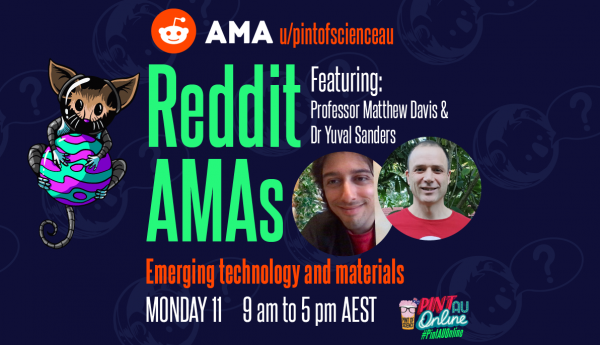
Our scientists will answer questions from using gravitational waves to discover gold, biodegradable materials in electronics, and the future of technology design and function. Ask them anything!
Professor Matthew Davis u/MattDavisPhysicist
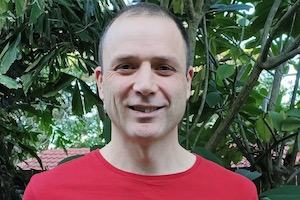
I am a theoretical quantum physicist with a passing resemblance to Sheldon Cooper. I teach physics at the University of Queensland, and simulate superfluids - tiny puffs of atoms that form a few billionths of a degree above absolute zero. My research focuses on the out-of-equilibrium behaviour of superfluids – systems that can flow without friction, so that once they start moving they will never stop! I want to understand how vortices and turbulence arise in superfluids, and how to make quantum engines from them, aiming to utilise new quantum materials to design ultra-low power transistors that could lead to a paradigm shift in computing technology.
Dr Yuval Sanders u/YuralRishu
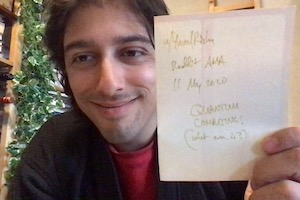
I’m a postdoc at Macquarie University, Sydney working on quantum computing. I specialise in designing and analysing quantum algorithms (programs for quantum computers), assessing noise in quantum computer hardware, and mathematics of quantum information. I also work at the Australian Research Council’s Centre of Excellence in Engineered Quantum Systems (equs.org), and do some mentoring with the Quantum Open Source Foundation (qosf.org).
May 12 ~ Anthropology, health and the elements
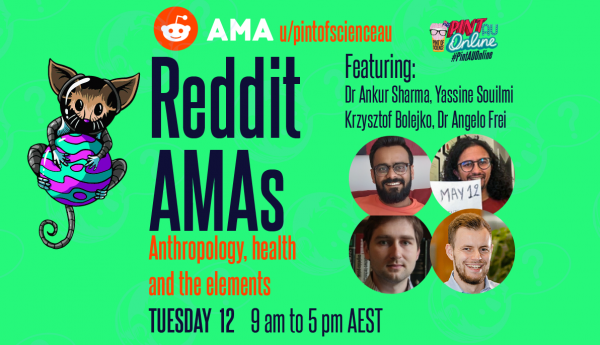
Following on from Monday’s session on emerging technology, ask us questions on electronic devices and the sustainable materials being created to drive functional improvements, using gravitational waves to discover new sources of materials like gold, the periodic table as inspiration for new drug discovery, and human health, evolution, and genetics.
Dr Ankur Sharma u/prof_sharma
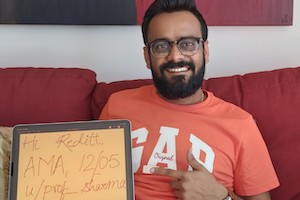
I received my Ph.D. in Photonics and Nanomaterial Engineering from ANU in 2019. My research included developing the first of its kind organic 2D semiconductor for future flexible and biodegradable electronic devices. My current research areas include working on novel nanomaterials for Micro and Nano systems for photonics and opto-electronic applications such as ultrafast miniaturized transistors, wearable health monitor systems, flexible displays and solar cell applications.
Yassine Souilmi u/ysouilmi
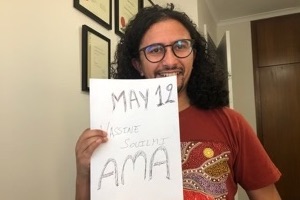
Since dawn of human kind in the African Savannah our ancestors embarked on journey to colonise every corner and environment in the world. This journey took us through wild experiences, strange encounters with hominin cousins (e.g. Neanderthals), and drove cultural changes. I will explain the impacts of such journey on our genes, how it influenced diversity, and how it even shaped our response to disease.
Dr Krzysztof Bolejko
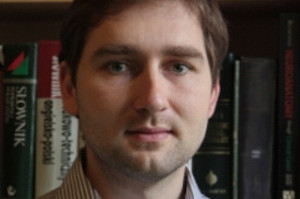
I'm a cosmologist working at the University of Tasmania. In my work I investigate mysterious of the Universe on very large scales, scales of millions of light years. You can ask me anything about the nature of dark matter, dark energy, gravity, higher dimensions, or anything else that relates to universe, cosmos, and everything within.
Dr Angelo Frei
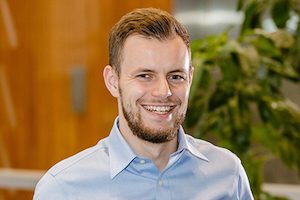
All current antibiotics are made of only a fraction of the elements on the periodic table. In my research I am looking into the huge variety of metals that we have available to develop new antibiotics with novel modes of action to help fight drug-resistant bacteria.
May 13 ~ Humans and life on Earth
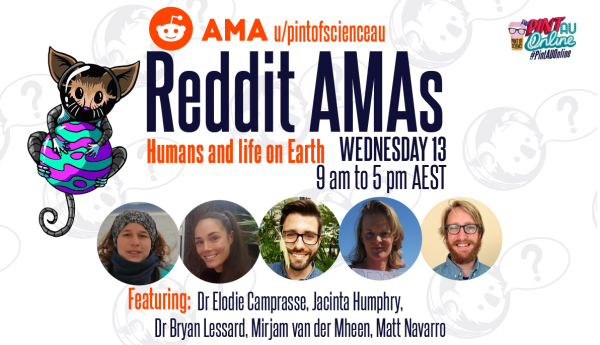
Interaction and harmonisation between humans, wildlife, urban and aquatic environments.
Dr Elodie Camprasse
Can we coexist with wildlife better? I'm a casual academic at Deakin University and have an interest for all living things, which started when I started diving when I was a teenager. I studied seabird ecology for my PhD, and ended up tagging pretty cool seabirds in remote areas in Australia and the Subantarctic. I've worked at Wildlife Victoria for a number of years and love chatting to people about animals and nature connection. After my PhD, I've been doing research on human-wildlife conflicts to understand the impacts human activities have on wildlife and find better ways to coexist with our furry, feathered and scaly neighbours. I also work at Remember The Wild, Australia's first nature connection charity, where I lead projects to connect the community to Port Phillip Bay and work together to ensure it has a healthy future.
Jacinta Humphrey u/Jacinta_Humphrey
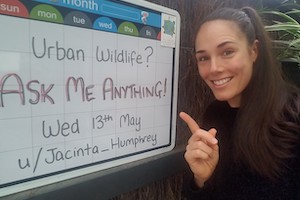
Hi, my name’s Jacinta Humphrey and I’m an Urban Ecologist, a PhD student and an all-round animal lover. I study the interactions between species and their habitat in an urbanised environment. I’m currently completing my PhD in this field with the Research Centre for Future Landscapes, at La Trobe University.
Specifically, my PhD focuses on the impacts of expanding urban development on birds. I’m interested in understanding how housing density and tree cover influence the diversity, abundance and composition of bird communities. Ultimately, I hope to develop some recommendations for local councils, management organisations and private residents on how to maintain or promote bird diversity in urbanised areas.
Last year, I made a short video summarising my research using stop motion and Lego! Check it out here: https://doris.latrobe.edu.au/doris/video/view/29661
Dr Bryan Lessard (Bry the Fly Guy)
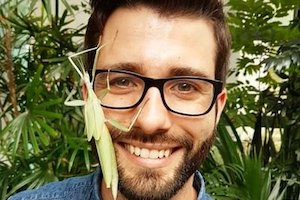
I'm an entomologist at CSIRO’s National Research Collections Australia researching the taxonomy and evolution of medically important flies and mosquitoes. I'm interested in discovering biodiversity, and have identified more than 150 species new to science and officially naming more than 50 species from Australia and New Zealand. I also enjoy working in collaborative teams to identify alternative insect pollinators using metabarcording, and to unlock the mysteries of natural history specimens using digitisation and collection genomics. More recently, I've developed an interest in 'edible insects', having advised insect farmers, industry and government to help develop guidelines on the use of insects to sustainably feed the growing population.
Matt Navarro
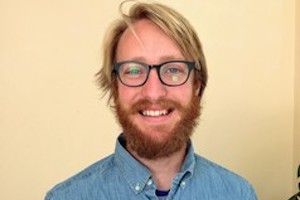
I’m Matt Navarro, a marine environmental economist studying everything marine parks and recreational fishing. I am a part-marine ecologist part-economist based at the University of Western Australia’s Oceans Institute. My research involves understanding how recreational fishers feel about marine parks and conservation. With this understanding, I hope to re-frame national debates around marine parks and highlight the role fishers can play in conserving our oceans.
Dr Mirjam van der Mheen
I am Mirjam van der Mheen and I am a physical oceanographer. I just finished my PhD research at the University of Western Australia. I research how plastic waste is transported by ocean currents, wind, and waves and where it ends up. Floating plastics concentrate in “garbage patches” in the middle of the subtropical oceans. But, of the several million tonnes of plastic waste that enter the ocean every year, probably only 1% ends up in these garbage patches. It is still a mystery what happens to the remaining 99% and finding out where this “missing plastic” goes in the oceans is one of the main questions in this research field.
